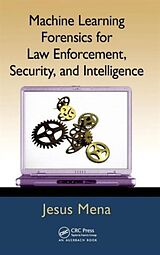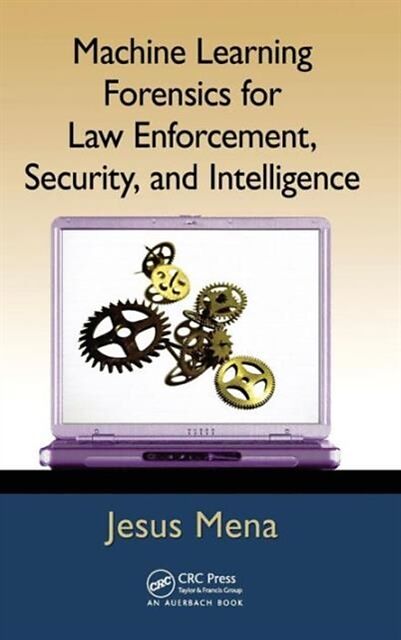Machine Learning Forensics for Law Enforcement, Security, and Intelligence
Einband:
Fester Einband
EAN:
9781439860694
Untertitel:
Intelligenc
Autor:
Mena Jesus
Herausgeber:
Auerbach Publications
Anzahl Seiten:
350
Erscheinungsdatum:
23.06.2011
ISBN:
978-1-4398-6069-4
Informationen zum Autor Jesús Mena is a former Internal Revenue Service Artificial Intelligence specialist and the author of numerous data mining, web analytics, law enforcement, homeland security, forensic, and marketing books. Mena has also written dozens of articles and consulted with several businesses and governmental agencies. He has over 20 years' experience in expert systems, rule induction, decision trees, neural networks, self-organizing maps, regression, visualization, and machine learning and has worked on data mining projects involving clustering, segmentation, classification, profiling and personalization with government, web, retail, insurance, credit card, financial and healthcare data sets. He has worked, written, and lectured on various behavioral analytics and social networking techniques, personalization mechanisms, web and mobile networks, real-time psychographics, tracking and profiling engines, log analyzing tools, packet sniffers, voice and text recognition software, geolocation and behavioral targeting systems, real-time streaming analytical software, ensemble techniques, and digital fingerprinting. Klappentext Increasingly, crimes and fraud are digital in nature, occurring at breakneck speed and encompassing large volumes of data. To combat this unlawful activity, knowledge about the use of machine learning technology and software is critical. This volume integrates an assortment of deductive and instructive tools, techniques, and technologies to arm professionals with the tools they need to be prepared and stay ahead of the game. It is a practical guide on how to conduct forensic investigations using self-organizing clustering map (SOM) neural networks, text extraction, and rule generating software to "interrogate the evidence." Zusammenfassung Increasingly! crimes and fraud are digital in nature! occurring at breakneck speed and encompassing large volumes of data. To combat this unlawful activity! knowledge about the use of machine learning technology and software is critical. Machine Learning Forensics for Law Enforcement! Security! and Intelligence integrates an assortment of deductive and instructive tools! techniques! and technologies to arm professionals with the tools they need to be prepared and stay ahead of the game.Step-by-step instructionsThe book is a practical guide on how to conduct forensic investigations using self-organizing clustering map (SOM) neural networks! text extraction! and rule generating software to "interrogate the evidence." This powerful data is indispensable for fraud detection! cybersecurity! competitive counterintelligence! and corporate and litigation investigations. The book also provides step-by-step instructions on how to construct adaptive criminal and fraud detection systems for organizations.Prediction is the keyInternet activity! email! and wireless communications can be captured! modeled! and deployed in order to anticipate potential cyber attacks and other types of crimes. The successful prediction of human reactions and server actions by quantifying their behaviors is invaluable for pre-empting criminal activity. This volume assists chief information officers! law enforcement personnel! legal and IT professionals! investigators! and competitive intelligence analysts in the strategic planning needed to recognize the patterns of criminal activities in order to predict when and where crimes and intrusions are likely to take place. Inhaltsverzeichnis What Is Machine Learning Forensics? Digital Investigative Maps and Models: Strategies and Techniques. Extractive Forensics: Link Analysis and Text Mining. Inductive Forensics: Clustering Incidents and Crimes. Deductive Forensics: Anticipating Attacks and Precrime. Fraud Detection: On the Web, Wireless, and in Real Time. Cybersecurity Investigations: Self - Organizing and Evolving Analyses. Corporate Counterintelligence: Liti...
Autorentext
Jesús Mena is a former Internal Revenue Service Artificial Intelligence specialist and the author of numerous data mining, web analytics, law enforcement, homeland security, forensic, and marketing books. Mena has also written dozens of articles and consulted with several businesses and governmental agencies. He has over 20 years' experience in expert systems, rule induction, decision trees, neural networks, self-organizing maps, regression, visualization, and machine learning and has worked on data mining projects involving clustering, segmentation, classification, profiling and personalization with government, web, retail, insurance, credit card, financial and healthcare data sets. He has worked, written, and lectured on various behavioral analytics and social networking techniques, personalization mechanisms, web and mobile networks, real-time psychographics, tracking and profiling engines, log analyzing tools, packet sniffers, voice and text recognition software, geolocation and behavioral targeting systems, real-time streaming analytical software, ensemble techniques, and digital fingerprinting.
Klappentext
Increasingly, crimes and fraud are digital in nature, occurring at breakneck speed and encompassing large volumes of data. To combat this unlawful activity, knowledge about the use of machine learning technology and software is critical. This volume integrates an assortment of deductive and instructive tools, techniques, and technologies to arm professionals with the tools they need to be prepared and stay ahead of the game. It is a practical guide on how to conduct forensic investigations using self-organizing clustering map (SOM) neural networks, text extraction, and rule generating software to "interrogate the evidence."
Inhalt
What Is Machine Learning Forensics? Digital Investigative Maps and Models: Strategies and Techniques. Extractive Forensics: Link Analysis and Text Mining. Inductive Forensics: Clustering Incidents and Crimes. Deductive Forensics: Anticipating Attacks and Precrime. Fraud Detection: On the Web, Wireless, and in Real Time. Cybersecurity Investigations: Self - Organizing and Evolving Analyses. Corporate Counterintelligence: Litigation and Competitive Investigations. Index.

Leider konnten wir für diesen Artikel keine Preise ermitteln ...
billigbuch.ch sucht jetzt für Sie die besten Angebote ...
Die aktuellen Verkaufspreise von 6 Onlineshops werden in Realtime abgefragt.
Sie können das gewünschte Produkt anschliessend direkt beim Anbieter Ihrer Wahl bestellen.
Loading...
Die aktuellen Verkaufspreise von 6 Onlineshops werden in Realtime abgefragt.
Sie können das gewünschte Produkt anschliessend direkt beim Anbieter Ihrer Wahl bestellen.
| # | Onlineshop | Preis CHF | Versand CHF | Total CHF | ||
|---|---|---|---|---|---|---|
| 1 | Seller | 0.00 | 0.00 | 0.00 |
